The College of Nursing has made the decision to put a hold on applications for the Winter 2027 intake of the Post-Degree Bachelor of Science in Nursing (PDBSN) program. Additional information regarding admissions, application timelines, and next steps will be communicated here as soon as they are available. We encourage you to check back regularly for the most up to date information.
About
Nursing is for compassionate people who want to make a difference in the world. It is the largest health care profession. You are invited to be a part of shaping the future of health in Saskatchewan and beyond.
The Post-Degree Bachelor of Science in Nursing (B.S.N.) is a two-year intensive program leading to a full B.S.N. degree. It is available to students who have completed a baccalaureate degree or have made significant progress toward a degree in another field. If this sounds like you, this option recognizes your previous university achievements and gives you the opportunity to earn a B.S.N. degree in a shortened period of time.
- Two-year continuous, full-time intensive program leading to B.S.N. degree
- You cannot begin this program directly from high school
- This option is only available through face-to-face instruction at the Saskatoon campus
Four-year Bachelor of Science in Nursing
If you do not have a degree or have not completed 90 credit units of recognized post-secondary study towards a degree, you would apply for the four-year Bachelor of Science in Nursing.
What you will learn
You will learn all aspects of health and well-being across a person's life span as you study nursing, health, and the health-care system through the creation and integration of knowledge from research, education, and practice. The nurse of the twenty-first century utilizes advanced technology to provide nursing care to individuals, families, groups, and communities.
Why study here?
At USask, your path to becoming a registered nurse is supported every step of the way through innovative teaching methods, a strong community of support and many opportunities for personal and professional development.
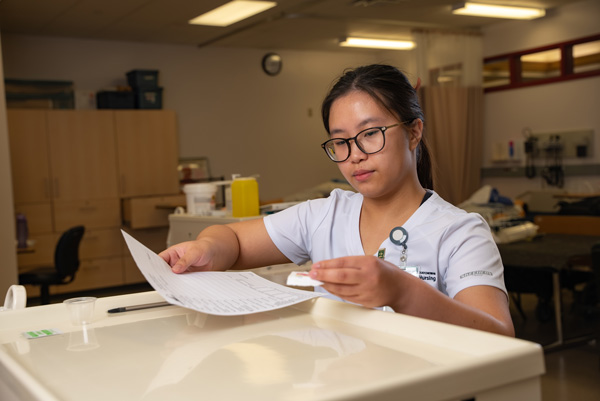
Clinical experience
Nursing requires clinical experience. Our program includes access to clinical practice opportunities in hospitals and community agencies with exceptional nurses committed to quality patient care. Clinical practice gives you experience, empowering you to make a difference in the future of health care.
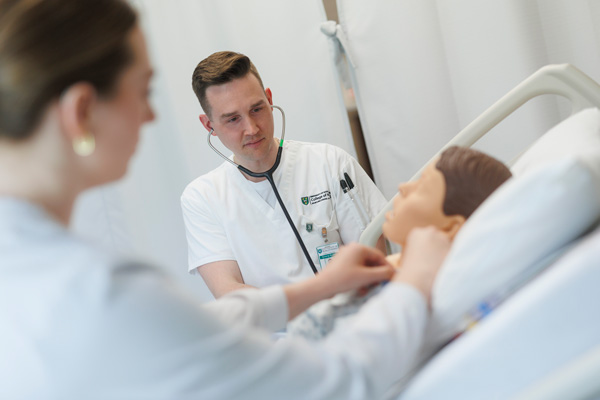
Interprofessional education
You will have many opportunities to interact with students and faculty from a wide variety of disciplines, such as clinical psychology, dentistry, kinesiology, medicine, nutrition, pharmacy, rehabilitation science, sociology, and veterinary medicine. Build relationships with individuals who will be working in other health science professions when you become a registered nurse.
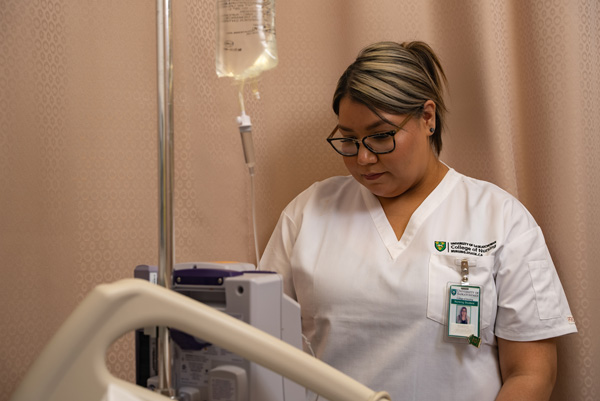
Indigenous students
To help Indigenous nursing students become successful nurses, the University of Saskatchewan Community of Indigenous Nursing (UCIN) will help you learn about careers in the field of health and find support and advising while you complete your B.S.N. The UCIN nursing advisor in Prince Albert works with students at all sites to build community and provide advisement and support. Although UCIN primarily supports Indigenous students through their nursing education, support is extended to all nursing students when needed.
The College of Nursing designates 16.6% of seats for Indigenous candidates who meet the minimum entrance requirements.
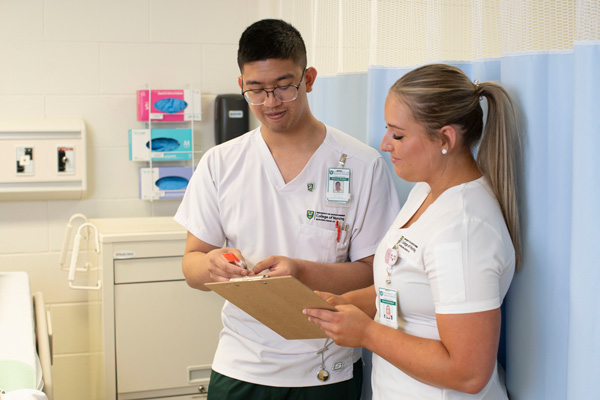
CASN accreditation and CRNS approval
The College of Nursing Bachelor of Science in Nursing program is a fully accredited program through the Canadian Association of Schools of Nursing (CASN) and has received a full seven year program approval from the College of Registered Nurses of Saskatchewan (CRNS) in September 2023.
Careers
Nursing is the largest health care profession in the world. Nurses work with their minds, hands, and hearts, while using advanced technology to provide health-care services to individuals, families, groups, and communities. Learn more about requisite skills and abilities necessary to pursue nursing as outlined by the College of Registered Nurses of Saskatchewan.
To become a registered nurse (RN), the following are required:
- a Bachelor of Science in Nursing (B.S.N.) degree (the outcome of our PDBSN option)
- clinical practice (included in our program)
- successful completion of the National Council Licensure Examination for Registered Nurses (NCLEX-RN)
- registration with a provincial regulatory body (College of Registered Nurses of Saskatchewan (CRNS)) in Saskatchewan
Wages
Learn more about hourly wages for RNs in Saskatchewan.
Nurses practice within a diverse range of positions and settings anywhere within Canada and around the globe and can choose from a variety of rewarding careers, including:
- Government - development of health-care policy
- International health agencies - clinical and non-clinical opportunities with agencies, such as UNICEF and the World Health Organization (WHO)
- Military Service - nursing officers
- Clinical practice
- Hospitals – medical, surgical, pediatrics, obstetrics, etc.
- Community – public health, schools, addictions, shelter agencies, etc.
- Long-term care – secure environments, care homes, rehabilitation residences, etc.
- Nurse educator
- Administration
- Non-profit sector
- Forensics
- Air ambulance
- Occupational health
- Northern nursing
- Rural and remote communities
- International settings - graduates interested in seeking employment in another province or country should expect a turn-around time of 4-6 weeks to complete the necessary documentation required to verify their education.
More careers are available with experience and advanced education:
- Administrator (Management)
- Counselor/therapist
- Educator
- Researcher
- Nurse practitioner
- Private practice
Professional associations available to RNs:
Student loan forgiveness
USask Nursing graduates may be eligible for student loan forgiveness by working as a nurse in eligible communities.
Nurses working in rural areas and populations centres with fewer than 30,000 residents can apply for loan forgiveness—up to $30,000 over five years—toward their federal student loan balance.
Canada student loan forgiveness
Nurses working in communities with fewer than 10,000 residents—including Île-à-la-Crosse, La Ronge, and Muenster—or specific centres including Lloydminster (SK), Prince Albert, Swift Current, the Battlefords, Weyburn, Estevan and Yorkton can apply to receive up to $20,000 over five years toward their provincial student loan balance.
Saskatchewan student loan forgiveness
Tuition estimates
| Canadian students | International students | |
|---|---|---|
| Tuition | $13,131 | $63,554.04 |
| Student fees | $1,457.58 | $1,457.58 |
| Books/Course materials | $1,500 | $1,500 |
| Total | $16,088.58 | $66,511.62 |
Tuition will vary depending on the type and number of classes you take in a year. This estimate reflects a typical amount you could expect to pay in your Year 1 if you enroll in a full course load, the maximum number of courses allowed (2025–2026 Canadian dollar rates). Note that this program (and the estimate above) includes classes in the Spring term.
Student fees are used to fund specific student benefits, including health, vision and dental coverage, a bus pass, recreational programs, and fitness centre access.
The cost of books, course materials, and supplies varies widely across the different years of the program. It is recommended that you budget between $1,500–$2,500 per year.
Program details
The Post-Degree B.S.N. option, which begins in January, provides the opportunity for full-time, intensive study over six consecutive terms with program completion in less than two calendar years.
Admission requirements
The purpose of the Post-Degree Bachelor of Science in Nursing (PDBSN) option is to recognize previous university achievements of qualified students and give them the opportunity to earn a Bachelor of Science in Nursing (B.S.N.) degree in a shortened period of time.
Prospective students must complete academic and non-academic requirements to be eligible for consideration. Admission to the College of Nursing PDBSN option is competitive and based on:
- Admission average (60% weighting)
The calculated average of your most recent 60 credit units of coursework towards a degree; all courses towards a degree within each academic year must be included - Situational judgment test score (40% weighting)
- Completion of all other admission requirements
Baccalaureate degree
To be considered for admission to the PDBSN option, you must have one of the following:
- a baccalaureate degree of at least 90 credit units (cu) from a post-secondary institution recognized by the University of Saskatchewan; or
- significant progress toward a bachelor's degree (completed 90 credit units of recognized post-secondary study towards a degree) by December 31 of the year prior to January of your expected entrance date. At least 36 credit units must be at the senior level (senior level courses are defined as comparable to courses at the 200 level and beyond at the University of Saskatchewan).
Prerequisite courses
See the detailed prerequisite equivalents for admission to the Post-Degree Bachelor of Science in Nursing program.
Learn more about transfer credit course-for-course equivalents from other universities. If you still have questions, please contact an academic advisor.
You may be considered for admission into the College of Nursing with ONE deficiency in the following prerequisite courses:
- Nutrition, or
- Social Science, or
- Indigenous Studies
If you are admitted with a deficiency, we recommend you clear the deficiency prior to the start of the PDBSN program of study, as the course load in the Post-Degree B.S.N. is very heavy, leaving no time for additional courses.
This deficiency must be completed by the end of April of the year you are admitted. Proof of completion must be received by May 31. A deficiency in the application to the PDBSN is defined by the College of Nursing as a prerequisite course not completed by April 30 of the admission year.
If you do not qualify for regular admission because your calculated admission average is less than 70%, you may be considered for special case admission into the Post-Degree B.S.N. option. Special case admission is available to applicants who:
- have a minimum average of 65% calculated in the same way as the regular Post-Degree B.S.N. admission averages;
- meet all other admission requirements, including prerequisite courses and situational judgement test; and
- are not currently enrolled in a B.S.N./PDBSN program.
Applicants are considered on a case-by-case basis and the seat may not be filled each year. Students must apply to the Post-Degree B.S.N. option by the posted deadlines and send documents required for admission by the posted document deadline.
If you are eligible for consideration for special case admission, we will request the following:
- A resume
- A letter to the associate dean outlining why you should be considered as a special case for admission. The letter should include:
- Relevant information on your academic record
- Work/life experience that highlights you as a special case for admission
- Any additional education
- Strategies for your success in the Post-Degree B.S.N. option
- Motivations for nursing
- Please include the names and contact information of three people who can provide a reference, for example: academic (one only), work place (direct report), volunteer/community
- An interview (We will contact short-listed candidates only.)
View a complete list of required documentation for admission in the Ready to Apply section below.
Situational judgment test (40% weighting)
The College of Nursing requires applicants to complete an online situational judgement test. This test, called Casper (Computer-Based Assessment for Sampling Personal Characteristics) assesses non-academic attributes and inter-personal skills essential for success in nursing.
The situational judgement test involves a series of video-or text-based scenarios and asks test-takers what they would do and why they would do it. The test assesses for communication, collaboration, equity, professionalism, problem solving, empathy, motivation, and ethics. There are no wrong answers.
To take the test, applicants must create an account and reserve a test date. Government issued photo identification is required. Note "Snapshot" is not required.
The Casper test must be completed by applicants in the year for which they are applying. Applicants who do not complete the test by the document deadline will be ineligible for admission. Please check the website carefully for available test times.
English language proficiency
The language of instruction at the University of Saskatchewan (USask) College of Nursing is English. A high level understanding and functionality in English is essential for safe client care in health professions in Saskatchewan.
For students to understand, communicate, and be successful in programs at the university, an acceptable level of academic English is required. You may be asked to provide proof of English proficiency.
If you have been asked to provide proof of your English proficiency, you can do so in the following ways:
-
Completion of high school and post-secondary studies in English
At least 3 years of full-time study in an approved English-medium secondary program including Grades 10, 11 and 12,1AND
at least 24 CU of the prerequisite nursing courses must be from a recognized post-secondary institution where English* is the official language of instruction and examination.1
* The post-secondary institution must declare English to be the only language of instruction and examination throughout the institution, not just in select departments.
1 If secondary or post-secondary study occurred more than five years ago, additional proof of English proficiency may be required.
The following English Language Curriculums would be considered acceptable at the high school level:
- Canadian English-medium schools
- Overseas schools offering a Canadian education system curriculum in English
- US regionally-accredited English medium schools
- International Baccalaureate Programme
- India - IGCSE (International General Certificate of Secondary Education) and CBSE (Central Board of Secondary Education) only
- GCSE (General Certificate of Secondary Education) O (Ordinary) Level & GCE (General Certificate of Education) A (Advanced) Levels
- NZQA (New Zealand Qualifications Authority)
- Australian State Curriculums
- CAPE (Caribbean Advanced Proficiency Examinations)
- SQA (Scottish Qualifications Authority)
- NQAI (National Qualifications Authority of Ireland)
- WBQ (Welsh Baccalaureate Qualification)
Students who have not followed one of these secondary level curriculums, will be required to provide another form of proof of English proficiency. This list will be updated annually as required.
-
Completion of an accepted standardized test
English proficiency test Minimum score required for College of Nursing TOEFL iBT (Test of English as a Foreign Language) 90 Reading 20 Listening 22 Speaking 26 Writing 20 IELTS (International English Language Testing System) 7 Reading 6 Listening 6 Speaking 7 Writing 6 CAEL (Canadian Academic English Language Assessment) 70 Reading 60 Listening 60 Speaking 70 Writing 60
Categories of applicants
Applicants are admitted on the basis of the required post-secondary course work and the results of their Casper exam. Applications are accepted from residents of all Canadian provinces and territories and international countries. Canadian or international residency status is not considered in the application process.
The University of Saskatchewan (USask) is committed to equity, diversity, and inclusion, and proud to support academic opportunities for Indigenous students. We continue to grow our partnerships with Indigenous communities across the province, nationally and internationally and value the unique perspective that Indigenous students provide to strengthen these relationships. Verification of Indigenous membership/citizenship at USask is led and determined by the deybwewin | taapwaywin | tapewin: Indigenous Truth policy and Standing Committee in accordance with the processes developed to enact the policy.
16.6% of seats in this program are designated for Indigenous candidates who verified Indigenous membership/citizenship and verification of Indigenous membership/citizenship with documentation is required if you wish to be considered for one of these seats.
Candidates under consideration for these seats will be evaluated according to either:
- the standard selection criteria: academic record (60% weighting) and situational judgement test score (40% weighting)
or - academic record (100% weighting).
Please visit the Indigenous Membership/Citizenship Verification channel in PAWS and proceed through the verification system.
You can learn more about learn more about deybwewin | taapwaywin | tapwewin at indigenous.usask.ca. If you have any questions or require additional information about deybwewin | taapwaywin | tapwewin please contact: indigenoustruthpolicy@usask.ca.
The University of Saskatchewan provides services and/or accommodations for students with disabilities. All students with disabilities are encouraged to register with Access and Equity Services (AES). Access to most services and programs provided by AES is restricted to students who have registered with the office. If you have a disability you must contact AES. Learn more about requisite skills and abilities necessary to pursue nursing as outlined by the College of Registered Nurses of Saskatchewan.
International students are welcomed. Applicants who self-identify on the application form as being ESL (English as a Second Language) or EAL (English as an Additional Language) are required to provide proof of English proficiency to determine admission to the program.
If you are a registered nurse from outside of Canada, you should contact a College of Nursing academic advisor for more information on requirements, prior to submitting an application.
Students who have previously received a faculty action (required to discontinue or RTD, required to withdraw, advised to discontinue, or academic probation) are required to submit a letter to the Admissions Office by the document deadline, August 1. The letter should explain the reason(s) for the faculty action and outline any strategies and supports implemented to promote future success in the nursing program, if admitted to the College of Nursing. This letter will be reviewed by the associate or assistant dean.
Note: Students are not considered for application if they are currently in their RTD period.
Like standard applicants, transfer applicants are admitted on the basis of post-secondary work and a test of situational judgement and must meet the same admission criteria.
Any transfer credit given for prior nursing courses will be determined by the College of Nursing.
Ready to apply?
This program is currently on hold.
Submitting required documents
Submission Address: Recruitment, Admissions and Transfer Credit
Deadline: program currently on hold
Transcripts from all post-secondary institutions (regardless of whether or not they pertain to nursing), must be mailed directly from the institution to Recruitment, Admissions and Transfer Credit. Please note the applicant cannot submit the transcript(s).
- Send official transcripts by August 1 for all course work completed up to the end of June of the year prior to your expected admission and from each post-secondary institution (other than USask) you have attended.
- Submit an unofficial transcript or proof of registration for courses being taken between July 1 and December prior to January 1 of the year of your desired entrance date. A final transcript must be sent when all courses are complete.
If you are required to provide proof of English proficiency, it is your responsibility to have completed a relevant test with the appropriate score before the application deadline. View specific requirements above.
The University of Saskatchewan (USask) is committed to equity, diversity, and inclusion, and proud to support academic opportunities for Indigenous students. We continue to grow our partnerships with Indigenous communities across the province, nationally and internationally and value the unique perspective that Indigenous students provide to strengthen these relationships. Verification of Indigenous membership/citizenship at USask is led and determined by the deybwewin | taapwaywin | tapewin: Indigenous Truth policy and Standing Committee in accordance with the processes developed to enact the policy.
16.6% of seats in this program are designated for Indigenous candidates who verified Indigenous membership/citizenship and verification of Indigenous membership/citizenship with documentation is required if you wish to be considered for one of these seats.
Candidates under consideration for these seats will be evaluated according to either:
- the standard selection criteria: academic record (60% weighting) and situational judgement test score (40% weighting)
or - academic record (100% weighting).
Please visit the Indigenous Membership/Citizenship Verification channel in PAWS and proceed through the verification system.
You can learn more about learn more about deybwewin | taapwaywin | tapwewin at indigenous.usask.ca. If you have any questions or require additional information about deybwewin | taapwaywin | tapwewin please contact: indigenoustruthpolicy@usask.ca.
The University of Saskatchewan provides services and/or accommodations for students with disabilities. All students with disabilities are encouraged to register with Access and Equity Services (AES). Access to most services and programs provided by AES is restricted to students who have registered with the office. If you have a disability you must contact AES. Learn more about requisite skills and abilities necessary to pursue nursing as outlined by the College of Registered Nurses of Saskatchewan. Learn more about the University of Saskatchewan's Access and Equity Services.
Applicants who attended a nursing program in Canada and who have completed a minimum of six credit units or equivalent of nursing classes in Canada are required to submit the completed program reference form. The program reference form will be used to access the applicant's suitability for admission, based on the applicant's academic standing and previous performance in a nursing program.
Additional program entry requirement costs may run between $800 - $1,000. These costs are approximate.
- Criminal Record Check & Vulnerable Sector Search
- CPR/AED certification
- FIT testing (respiratory protection)
- TLR training (transferring lifting repositioning)
- Immunizations
- Standard uniforms
- Access to a working laptop
- Access to a mobile device
- Other supplies and resources
- Any costs related to housing and travel for clinical placements are the student's responsibility.
Apply
This program is not currently accepting applications.
College info
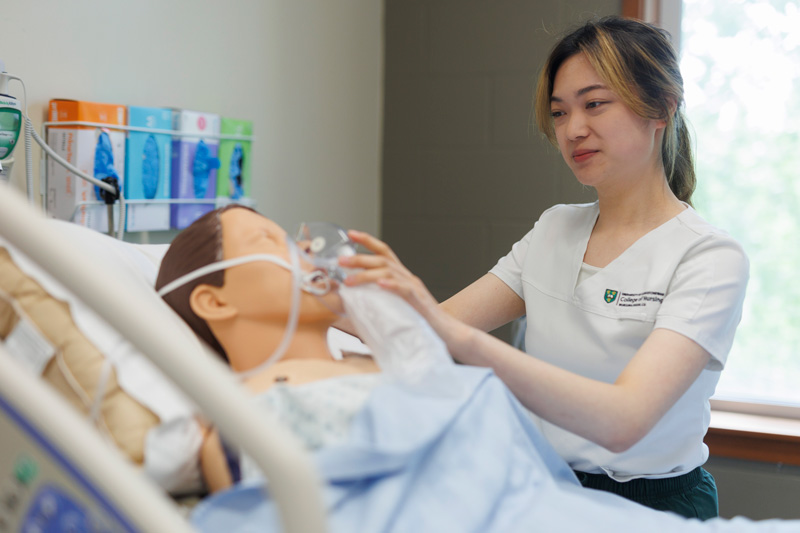
Established in 1938, the College of Nursing offers both undergraduate and graduate programming. The College of Nursing has campuses in Saskatoon and Prince Albert and uses distributed learning (e.g., video and web conferencing, lecture capture) to deliver its B.S.N. program to students in La Ronge, Île-à-la-Crosse, Lloydminster, Muenster, North Battleford, Swift Current, Weyburn, and Yorkton. All College of Nursing graduate programs are available distributively, meaning students can complete them from anywhere.
The College of Nursing has a long history of Indigenous student success and is recognized as having the highest number of Indigenous nursing students in the country.
Questions?
Phone: 306-966-6221
Toll-free: 1-844-966-6269
College of Nursing, University of Saskatchewan
Health Science Building – 1A10, Box 6
107 Wiggins Road
Saskatoon, SK S7N 5E5
Related programs
If you are looking for graduate level (master's or Ph.D.) programs please consult our graduate students' website.

